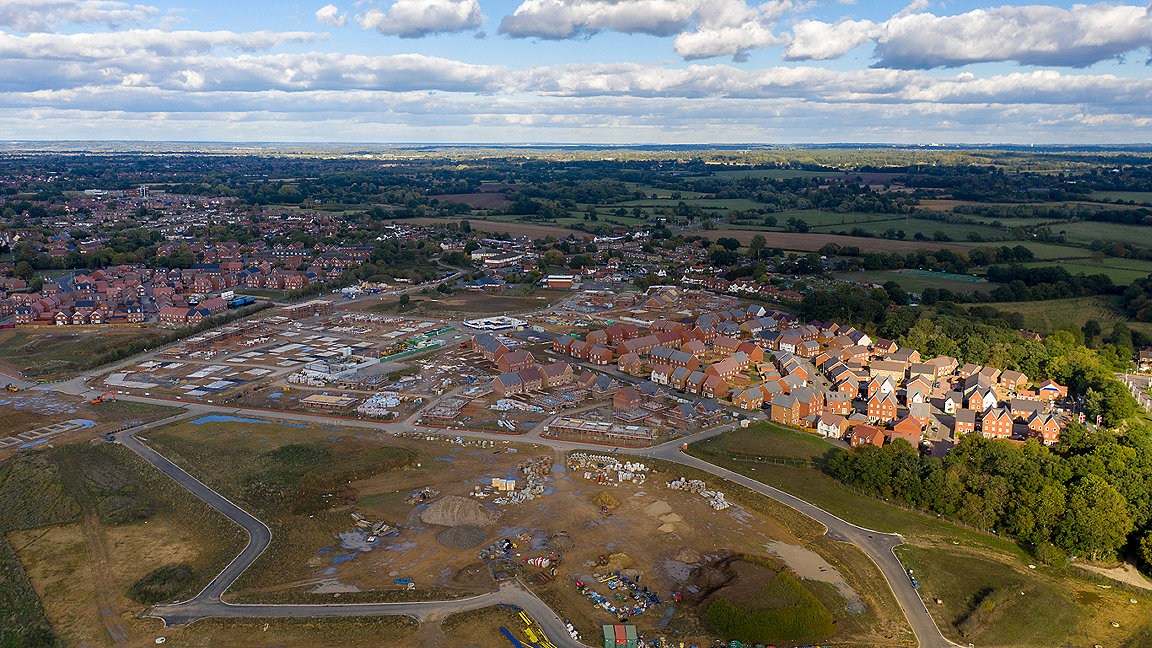
Land Journal: Can you tell us how you started in the sector, and what your job is now?
Theo Till: I studied part-time at university, which I would recommend to anyone else considering the profession. This allowed me to gain valuable experience that I could relate to my studies, begin building a network, and cut my teeth in the sector. I worked as an assistant surveyor to Peter Milner, an RICS fellow and leading planning and development (P&D) specialist.
During this time, I developed a passion for such work myself, and took an opportunity that came up in the P&D team at Savills. In this role, I advised clients on the sale and acquisition of development land, provided development consultancy advice, and prepared valuation reports, predominantly to banks.
I learned that each client selling a site has different goals. They do not all want to sell for the highest value: timing might be an issue, or they might want to take a joint venture partnership agreement with the developer. I went on to work for two other national consultancies before moving to Wheeldon Brothers Ltd in 2017 on the acquisition side.

Wheeldon is a Derbyshire-based housebuilder that constructs about 180 new homes a year across the East Midlands. My role as land acquisition manager is to acquire development sites for us to build much-needed homes.
This involves several stages. First, I monitor housing supply and demand, which helps identify need. Second, I review planning policy and competing planning applications to assess a site's potential for achieving planning permission. Third and finally, I value residential development land to assess the financial viability of a scheme. If it is viable, I negotiate the purchase and manage the acquisition through the legal process.
Risk analysis and economic future-gazing are two important functions in a land acquisition role. Interest rates are rising steadily at present, with recent hikes by the Bank of England and further increases forecasted. Despite high-street banks tightening their criteria, most lending institutions still seem happy to provide debt finance.
Because Wheeldon sells its homes to the private market, we must be vigilant about drop-offs in mortgage approval rates, and alert to any risk this might have for our order book. The ongoing cost-of-living crisis also presents new risks in terms of mortgage affordability.
As a company we are facing challenges. Materials shortages and build costs are soaring, and seriously affecting our build programmes and overall development viability. Furthermore, our supply chain is strained, and is demanding considerable management.
The land market is also exceptionally volatile at the moment. Transactional values are far beyond anything I've ever experienced. Again, we are back to simple economics: supply and demand. Most private housebuilders stopped purchasing land during the pandemic, and that has stunted their growth. But because house sales have continued to accelerate and the larger builders are desperately chasing volume to meet financial targets, they must continue to source a rare commodity: consented development land.
LJ: How do you think that the UK planning system, and the Levelling Up and Regeneration Bill in particular, can help deal with these issues?
TT: Like many others in the development industry, I believe the planning system in this country is not fit for purpose. There's an abundance of archaic policy that restricts development. It often feels as if the answer is no, even before the question has been asked.
Green belt policy is one roadblock and is often heavily debated in the industry. It was introduced in the Town and Country Planning Act 1947, effectively to stop the sprawl of settlements and protect green spaces. But we live in a wholly different way now, and there is huge pressure on local planning authorities to review their green belt to accommodate population growth. I appreciate the value of green spaces, which we have all recognised during lockdown. However, careful masterplanning can easily accommodate fantastic open spaces for people to enjoy.
Another policy commitment that is challenging, although for completely different reasons, is the target to build 300,000 new homes per year. This is a massive figure and current delivery of net additional dwellings is about 215,000 per year.
We're also failing to deal with the huge shortage of skilled planners at local authorities. Decisions made by qualified planning officers are often being overturned at planning committees by ill-informed councillors on political grounds. Planners are also leaving the public sector for corporate roles, away from the bureaucracy and political point-scoring.
Lack of staff and resources at local authorities together lead to delays with the validation of planning applications. I can't remember a single application I've dealt with over the past ten years that has been determined within the statutory time period, specifically eight weeks for a minor application or 13 for a major application.
If we submitted a planning application tomorrow and knew we could get a decision within 13 weeks, that would motivate us. But it's more like 13 months – at an absolute minimum – with huge financial risk and uncertainty, given the elected members' form of overturning a recommendation for approval at planning committee and the application being refused. Such refusals can be appealed and often there are cost implications for councils when an application for costs is granted. Somehow the same elected members continue to overturn planning applications and in turn increase their council's exposure to cost awards.
It is often a frustrating process. We've got a willing seller who's prepared to sell us the site; we've agreed a price; we have the financial backing, the skills and the materials to build. There's just a blockage in the system.
What I have read of the Levelling Up and Regeneration Bill doesn't fill me with excitement. We are also back to political point-scoring between the two final candidates for the Conservative leadership and the different ways they want to fix the broken planning system. Both seem to want a presumption in favour of brownfield sites. However, one wants planning reforms at a community level and the other at a national level, going back to the zonal system that was mooted before the introduction of the levelling-up agenda.
We've also got a homelessness crisis, and we need to be doing more about affordable housing. And while sustainability is rightly high on the agenda, the government would still welcome houses in an isolated village provided these were built sustainably. There's no joined-up thinking. The system just seems to be broken, and it's up to the government to deal with that through its levelling-up agenda.
'It often feels as if the answer is no, even before the question has been asked'
.jpg)
LJ: Alongside your day job you're also chair of RICS Matrics. Could you tell us how you got involved, and what you get out of it?
TT: I joined my local RICS Matrics committee in Derbyshire in 2011. I found the network was somewhere I could meet like-minded people and understand what was happening locally in the market, particularly interesting projects, and discuss business opportunities.
It has also been a huge help because I've developed interpersonal and professional skills through Matrics. I've had a platform to establish who I am professionally, and speak to others at the same level. It has given me confidence.
After stepping down as Chair of Derbyshire Matrics, I joined the UK and Ireland Matrics board in 2017, which effectively sets the sets the strategy for the network, works with RICS to implement its agenda and is accountable to the UK and Ireland World Regional Board. We provide finance and best practice advice, and support close to 30 local groups across the British Isles.
In November 2021, I became chair of our board of ten surveyors in the UK and Ireland, which is a huge honour. I ensure we perform to the best of our collective ability, fulfil the objectives set for us by RICS and work with it to implement the Matrics strategy. At present, this strategy focuses on inspiring, supporting and engaging with the next generation of professionals. One particular area we are looking at is empowering local groups to recommence in-person events as we recover from the pandemic.
So far in 2022, we have organised 65 in-person events and appointed 12 regional chairs to help implement our agenda. I was proud to support the RICS Jubilee Beacon initiative and I am looking forward to our chair's welcome event in Birmingham in September – the first time the local group chairs will have been together in two-and-a-half years.
I want to leave Matrics in a better place than I found it – which is a challenge, considering the great work that's been done in the past. So I'd like to continue to provide support, inspire future generations and raise the profile of careers in surveying. I'm pleased to say we've recently secured more funding from RICS, as this had been significantly constrained during the pandemic.
Matrics has more than 90,000 members at the moment, and we want to increase that number. We also want to ensure that when people become chartered members they stay involved with RICS. We don't want to lose that talent – whether people want to become part of a professional group, engage with the communications team, or sit on a disciplinary panel or Governing Council. Lord Bichard's review concluded that RICS Matrics should be reinvigorated to give younger members a stronger voice in the organisation and I look forward to working with RICS and Matrics to implement this.
I'm a big believer in diversity and inclusion, and my priority is to ensure that everybody feels welcome. Matrics isn't a secret society. It's open to all, and there's something for everyone.
LJ: What would you tell someone coming into P&D about the skills that are most useful?
TT: Effective interpersonal and decision-making skills are crucial to the work of a land acquisition manager. You need to understand the expectations of the company you work for – what is the land acquisition strategy? How many plots do we need to secure annually? Across how many sites? In which locations? What are the expectations of our landowners?
Numeracy skills are important too. I often need to analyse and sense-check figures and carry out financial forecasting.
One must also understand that the whole development process is about risk – the business of building houses is fuelled by accepting that risk. As a housebuilder, we need to know what we can do to minimise risk on any site before we buy it and start development.
LJ: And with your experience of Matrics, what issues do you find your peers are facing?
TT: The economy is a major issue at the moment, as I mentioned. But quite rightly sustainability is also at the heart of a lot of decision-making. We're becoming more environmentally conscious, trying to understand what we do with the buildings we're developing and how people live in them sustainably.
Job satisfaction is also critical. Particularly during COVID-19, a few of my peers were wondering: 'Am I living the life I want to?' They also asked, 'I want more flexibility – will my company give me that?'.
Planning's at the at the heart of what we do, so it's critical that the system in this country is fit for purpose. But until political infiltration is reduced, I don't think anything will change. The other point I'd like to make is that nimbyism is continuing to play an unwelcome role in planning. I'd go so far as to say it's reached the 'banana' stage; that is, 'build absolutely nothing anywhere near anyone'. This is another issue I'd like to see addressed. But given the political angle and the shift back to localism, I just can't see that happening.
Theo Till is land manager at Wheeldon Brothers Ltd and RICS Matrics UK board chair
Related competencies include: Development appraisals, Planning development and management, Spatial planning policy and infrastructure

